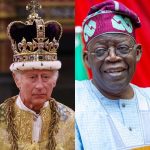
In a historic inaugural speech at Eagle Square, President Bola Tinubu announced the end of the era of petrol subsidy, emphasizing its unsustainability and the need to channel the funds into critical sectors. He also pledged to review the naira redesign policy of the previous administration and work towards unifying the country’s exchange rate windows.
President Tinubu acknowledged the hardships endured by Nigerians and assured them that their mandate was not misplaced. He expressed his commitment to governing rather than ruling the nation, vowing to consult, dialogue, and respect the views of all citizens, including the opposition.
Regarding monetary policy, the President highlighted the need for a unified exchange rate and reduced interest rates to stimulate meaningful investment and consumer purchasing. He acknowledged that the recent currency swap implemented by the Central Bank of Nigeria (CBN) was harsh, particularly for the unbanked population. Tinubu promised a thorough review of the policy, affirming that both the old and new currencies would be treated as legal tender during the transition period.
In addressing the issue of petrol subsidy removal, President Tinubu commended the outgoing administration for phasing out the regime, which he believed had disproportionately favored the wealthy. He pledged to redirect the funds saved from the subsidy towards public infrastructure, education, healthcare, and job creation, with the aim of improving the lives of millions of Nigerians.
Expressing gratitude to Nigerians for their support, Tinubu emphasized his commitment to the Nigerian ideal, which transcends economic statistics and encompasses compassion, brotherhood, and peace. He called for unity, urging all Nigerians to uphold fairness, equity, and collaboration between the North and South, emphasizing that he sees all Nigerians as his people, regardless of their background.
President Tinubu outlined his administration’s priorities, which include impartial governance according to the constitution and the rule of law, tackling insecurity through security reforms, promoting economic growth and development through job creation and domestic manufacturing, and improving access to affordable electricity.
He assured investors, both local and foreign, that their concerns regarding multiple taxations and anti-investment barriers would be addressed. Tinubu pledged to work with the National Assembly to pass an omnibus jobs and prosperity bill, which would create labor-intensive infrastructure projects, encourage light industry, and provide improved social services for the vulnerable.
The President also emphasized the importance of agriculture, promising to secure rural incomes through commodity exchange boards, reduce spoilage and waste, create agricultural hubs, and introduce modern practices in the livestock sector. These measures aim to increase food production and availability while reducing costs for consumers.
President Tinubu reaffirmed his commitment to infrastructure development and vowed to prioritize the progress of national networks of roads, rail, and ports. He also outlined his primary foreign policy objective, which is to ensure peace and stability in the West African sub-region and the African continent, collaborating with regional organizations and international partners to resolve conflicts.
The inauguration ceremony was attended by prominent figures such as former Head of State, General Yakubu Gowon, former President Goodluck Jonathan, Vice President Yemi Osinbajo, the Chief Justice of Nigeria, Olukayode Ariwoola, the Senate President, Ahmad Lawan, and the Speaker of the House of Representatives, Femi Gbajabiamila. Several heads of government from African countries, representatives from the diplomatic corps, service chiefs, ministers, and traditional rulers were also present.
President Tinubu’s speech laid out his administration’s vision for progressive governance, emphasizing unity, economic growth, social welfare, and a peaceful, prosperous Nigeria. As his term begins, Nigerians eagerly anticipate the implementation of





Comments are closed.